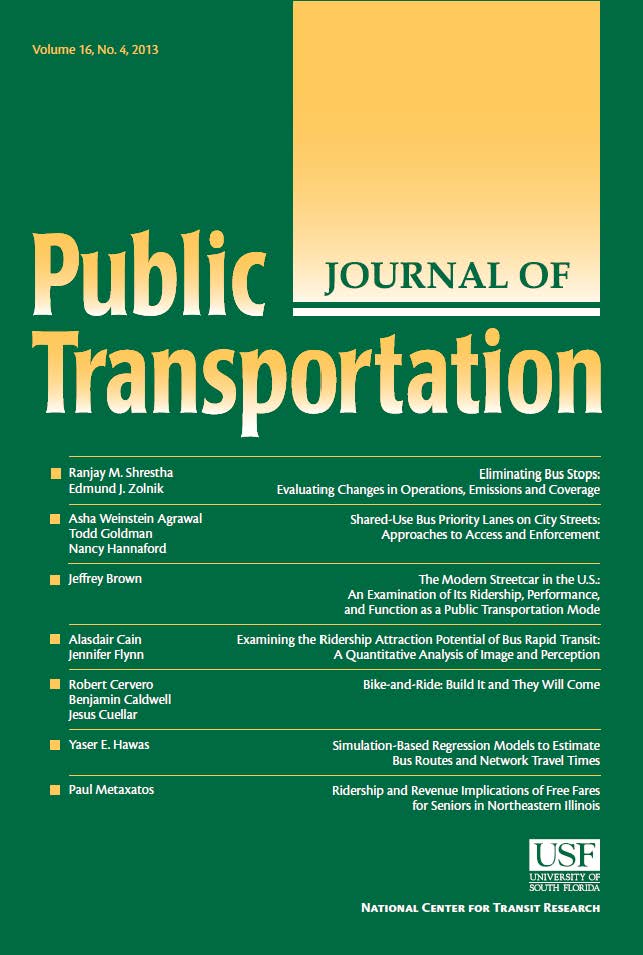Travel adaptations among women commuters in response to sexual harassment and fear of crime on public transport
IF 2
4区 工程技术
Q3 TRANSPORTATION
引用次数: 0
Abstract
Promoting public transport is widely regarded as a key strategy for advancing sustainability. However, concerns about women’s safety continue to pose a significant barrier to its regular use. A growing number of studies have highlighted the vulnerability of female commuters to harassment and crime, yet there is limited evidence on how these experiences –and the fears they generate– translate into changes in travel behavior. This knowledge gap makes it difficult to develop evidence-based interventions. Accordingly, this study examined the interrelations between sexual harassment, fear of crime, and travel-related behavioral adaptations among female public transport users in Spain. The analysis was based on a cross-sectional sample of 720 female public transport commuters. The average age of participants was 29 years. They responded to an e-survey addressing commuting patterns, perceptions of safety, and behavioral responses. Our results suggest that both direct and indirect experiences of harassment are consistently associated with higher levels of fear of crime, which in turn influence changes in travel behavior. Specifically, fear of crime was found to partially mediate the relationship between harassment and travel-related adaptations. These findings provide further insight into how psychological and contextual factors shape women’s use of public transport, and highlight the need to address not only actual incidents but also the broader perception of insecurity.
女性通勤者对公共交通上的性骚扰和对犯罪的恐惧的适应
推广公共交通被广泛认为是促进可持续发展的关键策略。然而,对妇女安全的关切继续对其正常使用构成重大障碍。越来越多的研究强调了女性通勤者在骚扰和犯罪面前的脆弱性,但关于这些经历以及由此产生的恐惧如何转化为出行行为的变化,证据有限。这种知识差距使得难以制定基于证据的干预措施。因此,本研究调查了西班牙女性公共交通用户的性骚扰、犯罪恐惧和旅行相关行为适应之间的相互关系。这项分析是基于720名女性公共交通通勤者的横断面样本。参与者的平均年龄为29岁。他们回答了一项关于通勤模式、安全感知和行为反应的电子调查。我们的研究结果表明,直接和间接的骚扰经历都与更高程度的犯罪恐惧有关,这反过来又影响了旅行行为的变化。具体来说,对犯罪的恐惧在一定程度上调解了骚扰与旅行相关适应之间的关系。这些发现进一步揭示了心理和环境因素是如何影响女性使用公共交通的,并强调了不仅需要解决实际事件,还需要解决更广泛的不安全感。
本文章由计算机程序翻译,如有差异,请以英文原文为准。
求助全文
约1分钟内获得全文
求助全文
来源期刊

Journal of Public Transportation
TRANSPORTATION-
CiteScore
6.40
自引率
0.00%
发文量
29
审稿时长
26 days
期刊介绍:
The Journal of Public Transportation, affiliated with the Center for Urban Transportation Research, is an international peer-reviewed open access journal focused on various forms of public transportation. It publishes original research from diverse academic disciplines, including engineering, economics, planning, and policy, emphasizing innovative solutions to transportation challenges. Content covers mobility services available to the general public, such as line-based services and shared fleets, offering insights beneficial to passengers, agencies, service providers, and communities.
 求助内容:
求助内容: 应助结果提醒方式:
应助结果提醒方式:


